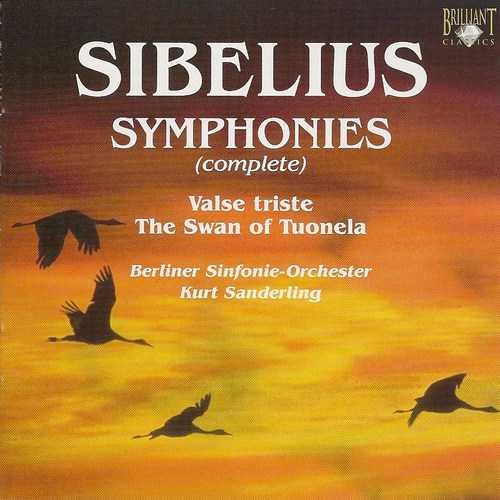
Audio CD
Number of Discs: 5
Format: APE (image+cue)
Label: Brilliant Classics
Size: 1.13 GB
Recovery: +3%
Scan: yes
Disc: 1
1. Symphony No. 1 in E minor, Op. 39: Andante ma non troppo – allegro energico
2. Symphony No. 1 in E minor, Op. 39: Andante (ma non troppo lento)
3. Symphony No. 1 in E minor, Op. 39: Scherzo, allegro
4. Symphony No. 1 in E minor, Op. 39: Finale, quasi una fantasia
Disc: 2
1. Symphony No. 2 in D major, Op. 43: Allegretto
2. Symphony No. 2 in D major, Op. 43: Tempo andante, ma rubato
3. Symphony No. 2 in D major, Op. 43: Vivacissimo
4. Symphony No. 2 in D major, Op. 43: Finale, allegro moderato
5. Symphony No. 3 in C major, Op. 52: Allegro moderato
6. Symphony No. 3 in C major, Op. 52: Andantino con moto, quali allegretto
7. Symphony No. 3 in C major, Op. 52: Moderato-allegro
Disc: 3
1. Symphony No. 4 in A minor, Op. 63: Tempo molto moderato, quasi adagio
2. Symphony No. 4 in A minor, Op. 63: Allegro molto vivace
3. Symphony No. 4 in A minor, Op. 63: Il tempo largo
4. Symphony No. 4 in A minor, Op. 63: Allegro
5. Symphony No. 5 in E flat major, Op. 82: Tempo molto moderato-allegro moderato
6. Symphony No. 5 in E flat major, Op. 82: Andante mosso, quasi allegretto
7. Symphony No. 5 in E flat major, Op. 82: Allegro molto
Disc: 4
1. Symphony No. 6 in D minor, Op. 104: Allegro molto moderato
2. Symphony No. 6 in D minor, Op. 104: Allegretto moderato
3. Symphony No. 6 in D minor, Op. 104: Poco vivace
4. Symphony No. 6 in D minor, Op. 104: Allegro molto
5. Symphony No. 7 in C major, Op. 105
Disc: 5
1. Finlandia, tone poem for orchestra, Op. 26
2. Valse Triste, for orchestra (from Kuolema), Op. 44/1
3. Night Ride & Sunrise (Öinen ratsastus ja auringonnousu), symphonic poem for orchestra, Op. 55
4. The Swan of Tuonela, tone poem for orchestra (Lemminkäinen Suite No. 3), Op. 22/3
5. En Saga, tone poem for orchestra, Op. 9
sanderling_sibelius_symphonies02.rar – 299.0 MB
sanderling_sibelius_symphonies03.rar – 262.6 MB
sanderling_sibelius_symphonies04.rar – 222.1 MB
sanderling_sibelius_symphonies05.rar – 247.9 MB
Sanderling’s Sibelius: Brooding, slow, inevitable
I like my Sibelius slower, rather than faster. And Kurt Sanderling is one of the few old-school European conductors whose grasp of tempo is absolutely rock steady. He can set a slower pace, even one that at first seems dangerously risky for a certain piece of music, and hold it so steady and so true that the musical argument or narrative unfolds as if there were no other way for it to unfold.
In my view, to my ear: this is exactly what Sibelius needs. Within the basic tempo, then, Sanderling lets all the frisky lights and brooding darks of Sibelius’ real strangeness come through. Even in the first symphony, which gets short shrift by eveybody noting that it is too indebted to Tchaikovsky and others, Sanderling reveals that Sibelius had something new to say, even if he started with received forms.
By the second symphony, I am totally hooked. Deliberately, just as if far northern skies were brewing up fire or ice or northern lights, Sanderling just sits you down and shushes you into quiet so that you can experience it all, rather like being seated observantly in some almost non-humanized natural landscape. I suppose Sanderling’s approach just wouldn’t wash, except that his players (Berlin Symphony) can follow him and bring his unforced vision into being without fluffs or weaknesses or glitches of superficiality.
By taking Sibelius seriously, though not lacking in flashes of humor, Sanderling/BerlinS encourage us to see something truthful in all the mysterious, trembling and troubled volcanic shadows Sibelius could so uniquely conjur. I think people may sometimes not warm up to this sort of interpretation, since it hardly bothers to put much of a smiling human face on its representations of nature as evolving form and process. We might just as well not be the point here, as humans.
But, having seen lots of human meanness upon which I prefer not to dwell too constantly, I find this independent sense of the natural that I think Sibelius captures all to the good. Dark and even cruel things may happen in the north woods, but the sheer egoism and pettiness of human cruelty is missing. Instead the great earth goes its own ways, with profound shifts occuring sometimes so slowly that human sight need not bother.
In Sanderling’s truthful and capable hands, the Berlin Symphony simply lets Sibelius cast the spells he brewed up, so.
My recommendation is five stars, then. And the pricing will not gouge too much either. All told, this set is a genuine bargain, musically and otherwise. Stop reading reviews, and order it before it disappears again.